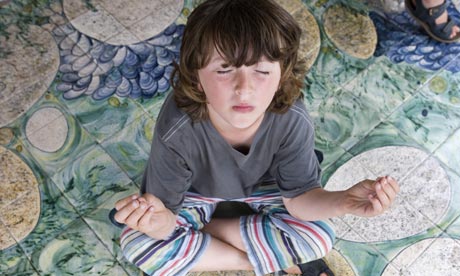
As educators, we have a genuine wish to contribute to a happier society. And yet, we sometimes wonder how we can keep this intention alive and make it a reality.
Do you remember this letter written by a Holocaust survivor? It said: "My eyes saw what no person should witness: gas chambers built by learned engineers. Children poisoned by educated physicians. Infants killed by trained nurses. Women and babies shot by high school and college graduates. So, I am suspicious of education. My request is: Help your children become human."
A few of us like-minded educators met in the late-90s during mindfulness retreats that we attended regularly in France and in the UK. We were young and looking to live by values of peace and compassion, in a way that was neither cranky nor hairy fairy. What are the qualities that make the Nelson Mandelas and the Dalai Lamas of this world? Could we cultivate such qualities in ourselves and impact the young people around us?
With the ups and downs of every day circumstances, it is not easy to stay inspired and be true to our initial motivation as educators. It is tempting to look for professional satisfaction in outside praise, instead of tapping into the genuine wellbeing that comes from being fully present to those around us and to ourselves.
This is just why we decided to create the Mind with Heart network, dedicated to giving us and young people the space to investigate what happiness, empathy, altruism and compassion are.
Mindfulness, moment by moment non-judgemental awareness, is a good starting point. Mindfulness is face-to-face, engaged and present, without loosing, floating, or straying. It is a specific approach to paying attention, that improves mental focus, academic performance, emotional balance and develops human qualities such as kindness.
Recent research by Patricia Jennings, PhD and Mark Greenberg PhD, shows that mindfulness programmes that support teacher social-emotional competence, enhance the classroom environment, learning, as well as student social‐emotional development. The article also reviews the relationship between teachers' social and emotional competence and burnout.
As busy teachers, we don't want something extra to do. But mindfulness takes away a lot of the superimposed stress. By merely attending to the state of one's mind and a sense of physical presence, we can deal with what is going on without adding layers of complications. We can face our frustration with our year 9s and approach the same class the next day afresh.
Genuine mindfulness cultivates a non-judgemental attitude both to oneself and to others that leads to compassion. Strangely enough, the more care we feel for students and colleagues, the more energised and joyful we feel about ourselves.
Another dimension that our Mind with Heart network offers is opportunities to explore empathy and compassion with pupils. "Maths is a really useful skill for students to learn, and you can teach it in a way that builds self-esteem, but learning to develop compassion for oneself and for others is as vital, if not more." says Steve Cope, one of Mind with Heart's co-founders.
Many teachers commented, that even with one of the best programmes we have seen so far - the Social and Emotional Aspects of Learning (SEAL) - teaching empathy on the ground was difficult. Teachers found that with the pressure from exam subjects, they couldn't make the time necessary to deepen their own understanding of empathy. What if compassion was something that we learnt together with our class? What if we openly acknowledged with our students the high and lows of the human condition, and explored how we could cultivate positive attitudes of mind?
Another Mind with Heart educator says: "When you investigate these life skills with teenagers, you can relate in a more human way to your class, without compromising your expertise and authority as a teacher of your subject. We get an immediate feedback from the atmosphere of the class as our attitude of openness and respect is mirrored back to us by the students, creating conditions for their flourishing."
• Vinciane Rycroft is an educator specialising in sustainable development. She is a co-founder of Mind with Heart and offers workshops for teenagers on mindfulness and compassion.
The Guardian Teacher Network has a resource from Mind with Heart that explores empathy, compassion and emotions with teenagers. Take a look at it here.
Click here to sign up to the Guardian Teacher Network - it's quick, simple and absolutely free of charge, and you will get access nearly 100,000 pages of teaching resources.
Could you be one of our bloggers?
Do you have something you want to share with colleagues – a resource of your own and why it works well with your students, or perhaps a brilliant piece of good practice in teaching or whole school activity that you know about it? If so please get in touch. If you would like to blog on the Guardian Teacher Network please email emma.drury@guardian.co.uk and please don't be shy about commenting on blogs on this page.
Searching for your next role?
See our Schools Jobs site for thousands of the latest teaching, leadership and support jobs.
This content is brought to you by Guardian Professional.

